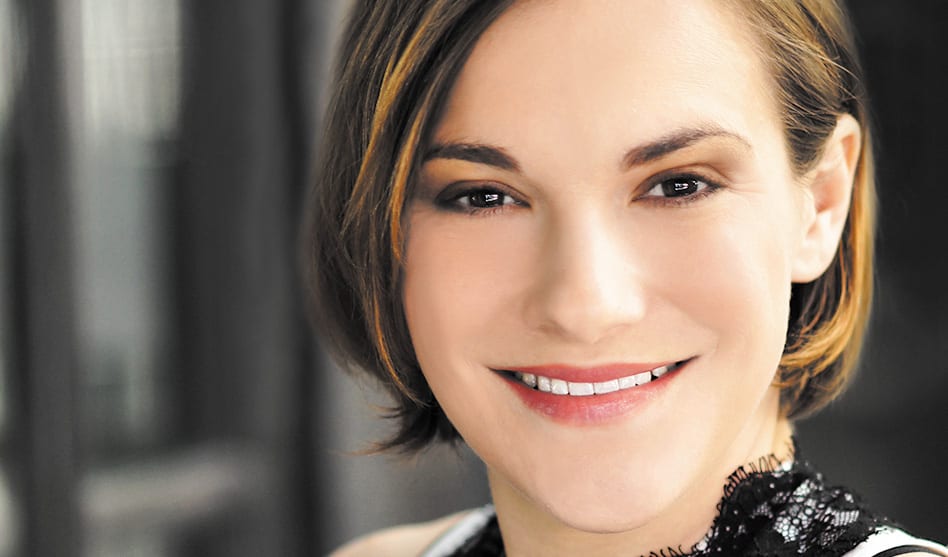Polyamorous Tony winner Daisy Eagan returns to the stage for ‘The Humans,’ a play about contemporary America that feels powerfully relevant
JONANNA WIDNER | Contributing Writer
Jonanna.widner@gamil.com
Daisy Eagan was only 11 when she won a Tony Award in 1991 for her role as Mary Lennox in The Secret Garden — still the youngest-ever female Tony winner. Since then, her life has taken many turns. Her mother died soon after that hallmark win, when Eagan was only 13. Later, she moved to the West Coast, married, had a son, divorced, and quit showbiz for several years (she returned to the stage in 2016 for a revival of The Secret Garden … though, of course, in a different role).
Oh, and she came out, too … in fact, she made her orientation public just before landing a role in the touring version of Stephen Karam’s hit play The Humans (itself a Tony-winning hit), which makes its Dallas stop this week at the Winspear. (See review Page 22.)
The Humans presents a family’s fraught Thanksgiving dinner, replete with the types of bittersweet realities most families endure: a parent suffering from Alzheimer’s, financial stress, generational differences and a gay daughter going through a breakup. And considering her personal history, you might expect that Eagan is playing the latter role. And in fact, Eagan originally auditioned to play Aimee, the lesbian daughter, because, “I always, always, always, always audition for the lesbian.” Instead, she was cast as Brigid, a 26-year-old with — shall we say — a lot to learn about life.
“It’s not like I had ever really been in, but I had come all the way out. So then I decided to play the lesbian and then they decided I wasn’t right for that role,” she notes, laughing at the irony.
You sense a lot about Eagan’s effusive personality as soon as you start talking to her. Smart, thoughtful and witty, she’s prone to tossing out funny, bold statements, and is definitely not afraid to speak her mind. In 2014, for instance, she wrote an open letter to New York Times theater critic Ben Brantley in which she called out “his shitty attitude on rape culture.” She’s an active blogger — recent topics include her own battles with depression, her current, polyamorous relationship and the awkwardness of seeing dudes in the gynecologist waiting room. Her forthrightness is refreshing… and also such a clearly essential part of who she is, one wonders whether it has ever affected her career.
“I’ve had to embrace the notion that some people will be very turned off by my honesty and some people will appreciate it,” she reflects. “And if someone is going to be grossed out by my honesty or lifestyle or whatever choices I want to make, then they’re probably not somebody I want to work with.”
In its open examination of basic human emotions, fears and problems, The Humans proves just as honest. What’s so striking about the play is that, though it was written in 2016, it digs deeply into the state of our country as a whole and feels up-to-the-minute. The New York Times praised The Humans by saying it “might almost qualify as deep-delving reportage, so clearly does it illuminate the current, tremor-ridden landscape of contemporary America.”
Although it deals with modern cultural issues, The Humans isn’t as heavy as it sounds — the profundity is buoyed by humor and some odd supernatural moments.
“I think audiences are hungry to see their own experience played out in fiction media,” Eagan says, noting that she and a fellow cast member “were just talking about Eugene O’Neill and about how tired we are of seeing his idea of what women and people of color were, and how we are much more inclined to want to see more accurate portrayals of non-straight-white men up onstage.
“I think audiences in general want to see [realism],” she continues, “so I think paying our rent isn’t just an everyday thing that we do — every decision we make as adults is wrapped up in ‘How am I gonna pay my rent?’ So it’s not just a small thing. It affects the partners that we choose, and it affects the reproductive choices that we make, the places that we live, everything.”
The parent figures in The Humans are somewhat conservative, disappointed that their children have chosen to struggle in New York City rather than stay at home. For their part, the kids view the change as a manifestation of freedom; the parents see it as a loss of values. “Taking this play out into this country, it’s interesting to watch people side with the parents more. I feel like we get the sense the audiences on tour are scared of change and scared of what has been happening in this country over the past 20, 30, 40 years,” Eagan says. (As if to hit home its basis in Americana, one of Eagan’s co-stars, Richard Thomas, is most famous for playing the scion of the quintessential TV family: He was John-Boy on The Waltons.)
It’s a lot to take in, but the play moves along at a fast clip, with plenty of humor. Eagan even counsels audiences on how best to enjoy it. “Don’t come late!” with a laugh. “And I also want to invite people to go along with the ride and not think too hard.”
After all, in the end, The Humans is relatable because it’s about all of us.

